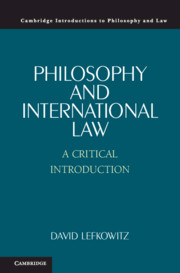Book contents
- Philosophy and International Law
- Cambridge Introductions to Philosophy and Law
- Philosophy and International Law
- Copyright page
- Dedication
- Contents
- 1 Introduction
- 2 John Austin: Enforcement and International Law
- 3 H.L.A. Hart: Social Rules, Officials, and International Law
- 4 Ronald Dworkin: Interpretivism and International Law
- 5 An International Rule of Law?
- 6 The Legitimacy of International Law
- 7 International Human Rights Law: Concepts and Grounds of Human Rights
- 8 The Law of War and Its Relationship to the Morality of War
- 9 International Criminal Law: Crimes Against Humanity and Universal Jurisdiction
- 10 International Law and Secession
- 11 International Trade Law: Free Trade, Fair Trade, and Trade in Stolen Goods
- Bibliography
- Index
2 - John Austin: Enforcement and International Law
Published online by Cambridge University Press: 10 October 2020
- Philosophy and International Law
- Cambridge Introductions to Philosophy and Law
- Philosophy and International Law
- Copyright page
- Dedication
- Contents
- 1 Introduction
- 2 John Austin: Enforcement and International Law
- 3 H.L.A. Hart: Social Rules, Officials, and International Law
- 4 Ronald Dworkin: Interpretivism and International Law
- 5 An International Rule of Law?
- 6 The Legitimacy of International Law
- 7 International Human Rights Law: Concepts and Grounds of Human Rights
- 8 The Law of War and Its Relationship to the Morality of War
- 9 International Criminal Law: Crimes Against Humanity and Universal Jurisdiction
- 10 International Law and Secession
- 11 International Trade Law: Free Trade, Fair Trade, and Trade in Stolen Goods
- Bibliography
- Index
Summary
This chapter considers two arguments for international legal skepticism, both of which appeal to an alleged analytical connection between law and coercive enforcement.The first is the legal philosopher John Austin’s characterization of law as the command of a sovereign, or in H.L.A. Hart’s apt phrase, as orders backed by threats.The second treats the mode of enforcement found in the modern state as a necessary condition for the existence of law.If true, each of these conceptual claims provides a sound basis for international legal skepticism.There are compelling reasons to reject them both, however.
Keywords
- Type
- Chapter
- Information
- Philosophy and International LawA Critical Introduction, pp. 8 - 19Publisher: Cambridge University PressPrint publication year: 2020

